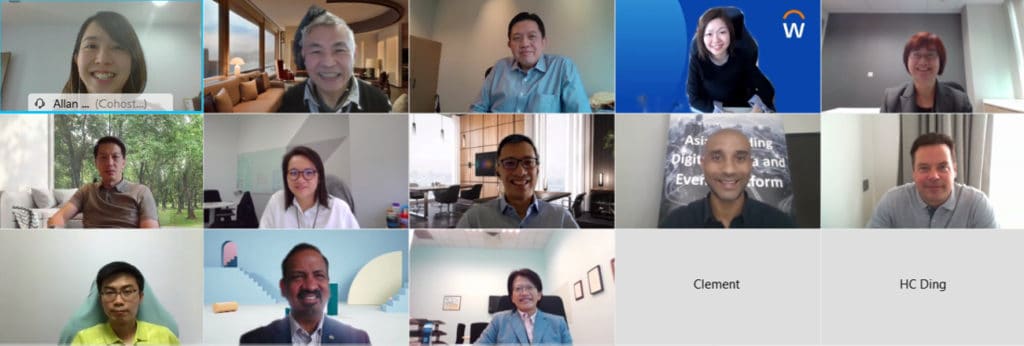The pandemic has put chief financial officers in the spotlight. No longer just finance stewards, they have taken on more proactive roles in steering the company forward. This has led to new calls for financial transparency, faster data sharing, and having the ability to create new models and explore multiple scenarios quickly.
To address these new needs, CFOs are helping to accelerate digital transformation. On-going polls conducted by FutureCFO re-affirm this imperative with more than two-thirds (over 70%) putting transformation as a priority in 2021. While this has improved the CFO’s ability to navigate the uncertain market landscape, it also introduces new challenges.
FutureCFO and Workday invited leading finance leaders to a virtual roundtable to understand these new challenges. The lively discussion highlighted the rising value of data in the CFO organization, the humanization of the role, and how CFO teams are becoming business partners.

New priorities
Charlene Tan, regional sales director at Workday, started the discussion by stating that the pandemic crisis, like any crisis, offered new opportunities. “There’s never been a more opportune time for the Office of Finance to have an impact,” she said.
Tan noted that to make this impact, CFOs need access to more data, create actionable insights quickly, and identify new opportunities. “And all these are happening against a backdrop of rapidly-changing business and regulatory environments,” she added.
Elizabeth Ng, the chief financial officer at Deloitte Singapore, agreed. She highlighted some of the challenges facing CFO: workforce disruptions during lockdowns and the pandemic’s impact on business and operations; requiring CFOs to rethink the future of work as the pandemic has reshaped the nature of work, to reimagine/adapt new business model and technology to digitise and restructure business/work processes. Organisations need to refocus on a smarter and more efficient ecosystem for their businesses.
“Last year (2020) was a good period to convince management and staff on digital transformation as the pandemic has increased their comfort to engage digitally. This has helped accelerate many of our digital transformation projects,” said Ng.
Ng further noted that “Automation, in the long run, will be advantageous for CFOs and this is an area that the company has prioritised.”
Realignment of the finance objectives
The roundtable participants echoed Deloitte’s Ng views on automation. Like her, Suzie Tan, senior vice president for finance at Marina Bay Sands, noted that the pandemic helped her board and key stakeholders see the value of digitization.
For example, RPA quickly became vital for her organization — especially with a remote workforce. “When you are unable to audit or do something like that while at home, you realize the value of pushing more technologies,” she said.
“I think having the stakeholders at the very top becoming aligned to the transformation journey was extremely important. As we all know, it takes more than one person or team to drive success across the entire organization.,” said Michelle Quek, vice president, Business Operations and Finance at Ensign Info Security.
Ross Mackay, group head of Global Shared Services and Finance Optimization at International SOS, shared critical successes because of this digitisation drive. “We replaced our entire treasury system in five months remotely,” he described.
Technology also helped International SOS implement an AI-enabled OCR solution during the pandemic and enabled digital invoicing from hospitals and clinics. However, Mackay noted that while the benefits are clear for digitalization, implementing them during lockdowns is not always easy, depending on the complexity of the solution. He cited the implementation of a cloud ERP system as an example. His team used Zoom calls to design the various interfaces.
Tan Lee Thong, the chief financial officer practice lead for Asia at Workday, argued that the pandemic highlighted the digital gaps between the front and back offices.
“The front office was already transformed because the customer benefits [were clear]. But the back office continues to suffer because it is not pivoting fast enough. When the business model in the front end changed or evolved, you still end up dealing with a lot of manual stuff at the back end,” said Tan, adding that the pandemic forced companies to focus on back-office processes.
Meanwhile, Eric Tay, the chief financial officer at Research Instruments, noted that centralizing the new platforms and doing more in the cloud became crucial for CFOs. “But it is tough because every country is different [when it comes to lockdowns]. So, it’s not easy to roll these out,” he added, echoing MacKay’s point on digitalization during lockdowns.
Adding the human element and related risks
One area where roundtable participants highlighted as vital, yet not a traditional focus of finance, was the human perspective. The human toll of the pandemic and anxiety created in the workforce impacted morale and productivity. For CFOs, it was a risk that they could not ignore.
“For example, if your team has been around for a while when you work from home, you will know what and how to deliver. This is very difficult for new hires who will not know what their managers want,” said Marina Bay Sands’ Tan.
For Venkat Padmanabhan, president – Finance at Olam International, it comes to leadership. CFOs need to change the way they manage their teams or risk creating organizational silos.
Olam International showed its commitment to employees by making employee health and safety and job security priorities. Also, employee-focused actions — like moving affected employees to better hospitals — reinforced morale. “These things dramatically changed the motivation and loyalty of the team and put them at ease.”
The pandemic also saw traditional industries and companies who are resistant to digital changes relenting. Andrew Chew, the chief financial officer at Guocoland, understands this very well. His property development organization operates in a conservative market where paper-driven processes are common.
During the Singapore Circuit Breaker, the property industry stakeholders — from banks and suppliers to contractors — digitalized their documentation workflows, streamlined the processes, and adopted digital signatures to reduce the disruptive impact of locking down the human workforce.
“As a result, a lot of things became smoother,” said Chew. The observed benefits also allowed the industry to experience first-hand the benefits of industry-wide digitalisation and continued to embrace it post Circuit Breaker.
The new role of finance and data
In the closing remarks, Workday’s Tan (Lee Thong) noted that while technology adoption among CFO teams accelerated, there are still some critical challenges ahead. And some of them are new.
The first challenge is that technology is evolving too fast. So, CFOs need to look for future-proofed technologies.
At the same time, companies need to look beyond justifying costs. The pandemic may have helped change stakeholder mindsets, but as companies continue to operate on lean budgets, it will become harder to justify. So, for finance to work efficiently “requires a different way of selling to the management,” said Tan.
Data trust or integrity is another rising challenge. As CFO and the finance teams expand their data sources, especially when overlaying financial data with other data for better scenario planning and model analyses, data integrity becomes vital. Coincidentally, Tan noted that the CFO teams need talent who “know how to monetize data.” It is a break from the traditional finance role of being a financial steward to the organization.
“Especially with COVID-19, we are pushed towards strategic partnering, and we have to answer all these business questions to help the business navigate through all this crisis. But we have got data sitting all over the place, and on different systems.” Data integrity will also be crucial as CFO teams deploy AI and machine learning and strengthen their governance.
The biggest challenge, however, is changing the role of finance quickly to that of a business partner. Those companies who make this change can drive “frictionless finance” and help the different business units optimize their performance. “And to do this you, need to level up finance from a stewardship responsibility to a more data-driven strategy,” concluded Tan.




